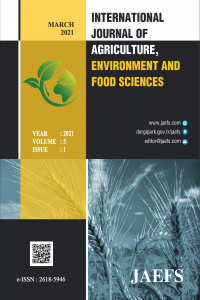Araştırma Makalesi
Analysis of knowledge transferred by agricultural field staff to cotton growers and its impact on rural development: evidence from Pakistan
Öz
Cotton is the main cash crop in Pakistan and it contributes 0.8% shares in GDP (Gross domestic product). The area of cotton in Pakistan is increased in recent years but its production is decreasing due to unfavorable climatic conditions. COVID-19 outbreak has also an effect on cotton consumption. From August 2019 to July 2020, the COVID-19 pandemic reduced global cotton consumption by 15%. Agricultural extension and advisory activities play an important role in agricultural development and can help to improve the living conditions of farmers. Keeping in view the importance of working in agriculture field staff for cotton, the present study was designed to analyze the quality of knowledge transferred by agriculture field staff. The present study was based on primary data and conducted in the district Muzfargarh becsasue it is one of major cotton producing district of Pujnab, Pakistan. A total of 180 respondents were taken from Tehsil Alipur of Muzfargarh from different union councils through a simple random sampling technique and interviewed through a pretested structured interview schedule. The data collected was analyzed using the Statistical Package for Social Sciences (SPSS). About 58% of the respondents identified that extension meetings are good source of information and 37.7% of the respondent said that agricultural field staff visit them on monthly basis.Impact of improved cotton management practices on health rated satisfactory by 52.77% of respondents. Based on findings it is recommended that the government should work with all stakeholders to implement regular training programs for cotton farmers in all areas.Monitoring of agricultural field staff should also be done on regular basis. Modern ways of communications should be implemented in rural areas for the quality of knowledge transfer among cotton growers.
Anahtar Kelimeler
Destekleyen Kurum
PMAS Arid Agriculture University, Rawalpindi, Pakistan.
Kaynakça
- Government of Pakistan. (2020). Economic Survey of Pakistan. Economic Advisor’s Wing Finance Division, Islamabad, Pakistan.
- Government of Pakistan. (2020). Pakistan Bureau of Statistics, Statistics Division Islamabad Pakistan.
- Meyer, Leslie A. (2019). Cotton and Wool Outlook, CWS-19g, U.S. Department of Agriculture, Economic Research Service, July 15, 2019.
- Mlambo, B.T., (2002). Strengthening the pluralistic agricultural extension system: a Zimbabwean case study. Food and Agriculture Organization of the United Nations (FAO) Itly.
- Baffes,J., Beghin, J. C., Aksoy, A. M.. (2005). Cotton Marketing Setting Trade Policies and Issues in Global Agricultural Trade and Developing countries,World Bank Publications. USA.
- Swinton, S.M., Day, E., (2000). Economics in the design, assessment, adoption, and policy analysis of IPM (No. 1099-2016-89279).
- Berdegue, J., Escobar, G., (2002). Rural diversity, agricultural innovation policies and poverty reduction. Agricultural Research and Extension Network.
- Kiely, T., Donaldson, D., Grube, A. (2004). Pesticides industry sales and usage: 2000 and 2001 market estimates. US Environmental Protection Agency, Office of Pesticide Programs, Washington, DC
- Kranthi, K.R., Jadhav, D.R., Kranthi, S., Wanjari, R.R., Ali, S.S., Russell, D.A. (2002). Insecticide resistance in five major insect pests of cotton in India. Crop Protection 21, 449–460.
- Khan, A., Akram, M. (2012). Farmers’ perception of extension methods used by Extension Personnel for dissemination of new agricultural technologies in Khyber Pakhtunkhwa, Pakistan. Sarhad J. Agric, 28(3), pp.511-520.
- Olorunfemi, T.O., Olorunfemi, O.D., Oladele, O.I. (2020). Determinants of the involvement of extension agents in disseminating climate smart agricultural initiatives: Implication for scaling up. Journal of the Saudi Society of Agricultural Sciences, 19(4), pp.285-292.
Yıl 2021,
Cilt: 5 Sayı: 1, 56 - 64, 31.03.2021
Öz
Kaynakça
- Government of Pakistan. (2020). Economic Survey of Pakistan. Economic Advisor’s Wing Finance Division, Islamabad, Pakistan.
- Government of Pakistan. (2020). Pakistan Bureau of Statistics, Statistics Division Islamabad Pakistan.
- Meyer, Leslie A. (2019). Cotton and Wool Outlook, CWS-19g, U.S. Department of Agriculture, Economic Research Service, July 15, 2019.
- Mlambo, B.T., (2002). Strengthening the pluralistic agricultural extension system: a Zimbabwean case study. Food and Agriculture Organization of the United Nations (FAO) Itly.
- Baffes,J., Beghin, J. C., Aksoy, A. M.. (2005). Cotton Marketing Setting Trade Policies and Issues in Global Agricultural Trade and Developing countries,World Bank Publications. USA.
- Swinton, S.M., Day, E., (2000). Economics in the design, assessment, adoption, and policy analysis of IPM (No. 1099-2016-89279).
- Berdegue, J., Escobar, G., (2002). Rural diversity, agricultural innovation policies and poverty reduction. Agricultural Research and Extension Network.
- Kiely, T., Donaldson, D., Grube, A. (2004). Pesticides industry sales and usage: 2000 and 2001 market estimates. US Environmental Protection Agency, Office of Pesticide Programs, Washington, DC
- Kranthi, K.R., Jadhav, D.R., Kranthi, S., Wanjari, R.R., Ali, S.S., Russell, D.A. (2002). Insecticide resistance in five major insect pests of cotton in India. Crop Protection 21, 449–460.
- Khan, A., Akram, M. (2012). Farmers’ perception of extension methods used by Extension Personnel for dissemination of new agricultural technologies in Khyber Pakhtunkhwa, Pakistan. Sarhad J. Agric, 28(3), pp.511-520.
- Olorunfemi, T.O., Olorunfemi, O.D., Oladele, O.I. (2020). Determinants of the involvement of extension agents in disseminating climate smart agricultural initiatives: Implication for scaling up. Journal of the Saudi Society of Agricultural Sciences, 19(4), pp.285-292.
Toplam 11 adet kaynakça vardır.
Ayrıntılar
| Birincil Dil | İngilizce |
|---|---|
| Konular | Ziraat Mühendisliği (Diğer) |
| Bölüm | Makaleler |
| Yazarlar | |
| Yayımlanma Tarihi | 31 Mart 2021 |
| Gönderilme Tarihi | 10 Aralık 2020 |
| Kabul Tarihi | 3 Şubat 2021 |
| Yayımlandığı Sayı | Yıl 2021 Cilt: 5 Sayı: 1 |
Kaynak Göster
International Journal of Agriculture, Environment and Food Sciences dergisinin içeriği, Creative Commons Alıntı-GayriTicari (CC BY-NC) 4.0 Uluslararası Lisansı ile yayınlanmaktadır. Söz konusu telif, üçüncü tarafların içeriği uygun şekilde atıf vermek koşuluyla, ticari olmayan amaçlarla paylaşımına ve uyarlamasına izin vermektedir. Yazarlar, International Journal of Agriculture, Environment and Food Sciences dergisinde yayınlanmış çalışmalarının telif hakkını elinde tutar.
Web: dergipark.org.tr/jaefs E-mail: editor@jaefs.com WhatsApp: +90 850 309 59 27



